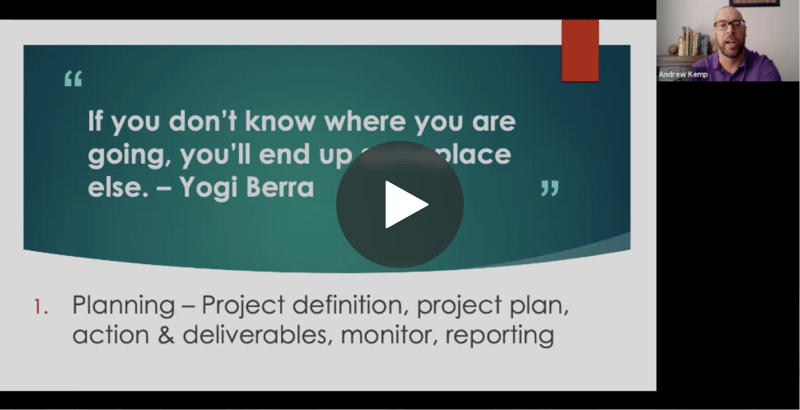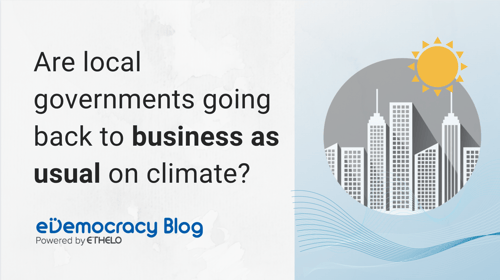.png?width=1000&name=How%20to%20get%20funded%20(1).png) Grants are essential to helping local governments take on new projects and initiatives, but staff members are often stretched too thin to find and apply for them. The latest webinar in the eDemocracy Webinar Series addressed this tension with an expert who has more than 20 years of economic development and sustainability experience.
Grants are essential to helping local governments take on new projects and initiatives, but staff members are often stretched too thin to find and apply for them. The latest webinar in the eDemocracy Webinar Series addressed this tension with an expert who has more than 20 years of economic development and sustainability experience.
Throughout his career, Andrew Kemp has worked within local governments, grant-funding programs, and the private sector. This diverse background makes him uniquely qualified to provide insights on how governments can be successful when it comes to writing and applying for grants.
Here are the eleven tips he shared for effective grant writing in local government, to ensure the next application you submit results in some much-needed funding:
1. Make a Plan
Simply put, if you don’t know where you want to go, you won’t be able to track the steps needed to get there. You should have a clearly-defined project plan, deliverables, monitoring mechanism, and reporting protocol. Having these things in place early on will save you hours of time when it comes to writing effective grant applications.
2. Choose the Right Partners
Not all funding organizations are created equal, and not everyone is going to be a fit for your project. Some might not even fund local governments at all. Before you start working on applications, make sure that the program you have in mind aligns with your project’s goals. When you have limited time and resources, you don’t want to waste them applying for a program that has no chance of being successful in the long run. When in doubt, talk with subject matter experts and outside advisers who can provide a valuable perspective on whether your municipality is a match with the funder.

3. Know your Funder's Goals
Funders make their resources available for a reason. Just like you, they’re trying to achieve a specific goal or solve a specific problem. Ask yourself whether your project helps to meet that goal or solve that problem and tailor your application accordingly. If your project does not align with the funder’s goals and needs, seek out other sources whose goals more closely align with yours.
4. Call the Funder
This one is pretty self-explanatory. It’s easy to send an email or communicate online, but nothing takes the place of a 30-minute phone call. The call will allow you to ask questions and better understand how your goals overlap with the funder’s goals. You’ll also build a rapport with the funder that will make them remember you when your application comes across their desk.
5. Review the Funder's History and Resources
Look at what types of projects were funded in the past. Do they align with yours? Many grant making organizations also provide details about how to apply and what the review process will look like. Once you’ve devoted time to writing a grant application, the last thing you want is for it to be thrown out because of a technicality, so make sure you review this information carefully throughout the application process.
6. Contact Funded Peers
Talk to people who have had projects funded by the same organization you are targeting. This will help you understand what the funder is like to work with, and what you might want to emphasize — or avoid — throughout the grant application process. You might also find opportunities for collaboration or further engagement down the road.
7. Read the Fine Print
Does the grant you’re applying for require letters of support? Matching funds? Other resources? Consider how much effort it will require to satisfy these requirements in relationship to how much you will receive from the funder. For example, you might decide that your time and energy are not worth it for a $5,000 grant, but they are for a $50,000 grant. Knowing the value of your time and what’s required of you early on will help you be as effective as possible in the grant writing process.

8. Create a Detailed Budget
Good writing skills will get you far in the application process, but they’re not everything. You also need to have a solid budget that shows you have a clear idea of how you will use the grant funds. You can fudge writing to tell a compelling story, but you should always be as accurate as possible so the funder knows exactly where their investment is going. Creating a thorough budget might also help you identify gaps in your thinking and adjust as needed to fill them before you submit the grant application.
9. Know your Strengths and Weaknesses
Like any organization, local governments are better at some things than others. Focus on doing what you’re good at and outsource what you’re not. For example, if you are not a good writer, reach out to your communications department or hire a freelance writer to help you. Funders reading a lot of applications are looking for those that are clear, concise, and free of jargon or too much marketing language.
10. Understand the Deliverables
When you are applying for a grant, it’s easy to get so caught up in the process that you forget what you need to do to deliver on what you promised. Before you apply, make sure you are able to provide all of the deliverables that the funder is looking for. How will you need to alter your process as a result of receiving the grant? Will you need to track expenses differently or conduct an audit? The answers to these questions may help you decide whether to apply or not.
11. Share your Success
After you put in all the hard work to apply for a grant, it’s time to celebrate the good news that you’ve received it! Use your communication channels to let your constituents know how the new funding is going to make their lives better. In addition, many grant making organizations utilize media campaigns and other communications tools to tell the stories of the good work their funded projects do. Make sure your local government is on the list of those projects to share. The added publicity can only help you make connections and build your capacity even more in the future.
Hear it from Andrew himself by access his full presentation below:
Want more practical advice from local government leaders?
Grab the recording below for our Webinar on how to create engaging, focused presentations that will dazzle City Councillors.




